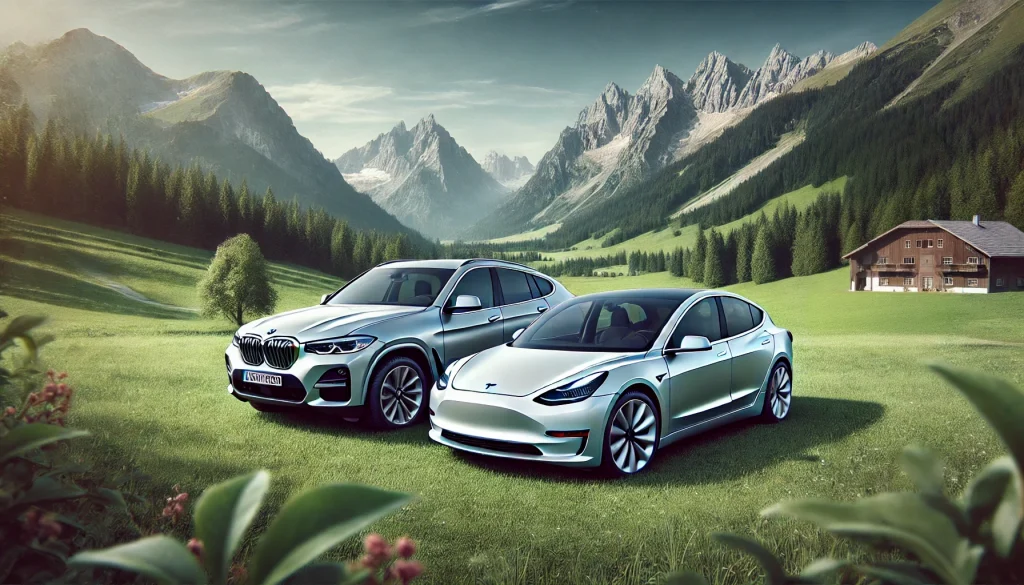As electric vehicles (EVs) gain traction worldwide, many drivers are weighing the financial benefits of making the switch from traditional gasoline and diesel cars to electric alternatives like Tesla. With growing concerns over rising fuel costs, environmental sustainability, and long-term maintenance expenses, the economic advantages of owning an EV are becoming increasingly attractive. This article provides a detailed comparison of the costs associated with purchasing, operating, and maintaining a Tesla versus a conventional gasoline or diesel vehicle, highlighting both short-term and long-term economic impacts.
Upfront Costs: Tesla vs. Gasoline and Diesel Cars
When considering the economic efficiency of owning a Tesla, one of the first points of comparison is the initial purchase price. While Tesla models are often positioned as premium vehicles, offering cutting-edge technology, sleek designs, and innovative features, their sticker prices can seem significantly higher than those of traditional gasoline or diesel vehicles. For example, the Tesla Model 3, one of the company’s more affordable offerings, starts at around $40,000, while the larger Tesla Model S and Model X can exceed $80,000. In contrast, a standard gasoline sedan or SUV can range from $20,000 to $50,000, making traditional cars appear more budget-friendly upfront.
However, it’s essential to take into account government incentives and subsidies that are available for electric vehicle buyers. In many countries, including the United States, federal tax credits of up to $7,500 can significantly reduce the effective purchase price of a Tesla. Some states and local governments offer additional incentives, such as rebates and reduced registration fees, further lowering the financial barrier to entry for EVs. Countries like Norway, Germany, and the United Kingdom also offer substantial incentives, making Tesla and other electric vehicles far more accessible than their initial price might suggest.
Additionally, as battery technology advances and EV production scales up, the cost of producing electric vehicles is expected to continue decreasing. With battery costs dropping, automakers like Tesla will be able to offer more competitively priced models in the near future, reducing the price gap between EVs and internal combustion engine (ICE) vehicles.
Fuel Costs: The Clear Advantage of Electric Vehicles
One of the most significant economic advantages of owning an electric vehicle is the drastic reduction in fuel costs. Traditional gasoline and diesel vehicles are subject to fluctuating fuel prices, which can make the cost of driving unpredictable. In contrast, electric vehicles like Tesla run on electricity, which is generally more stable and cost-effective than gasoline or diesel.
On average, charging an electric vehicle costs less than half the price of filling up a gasoline car for the same mileage. For instance, charging a Tesla Model 3 at home with a standard electricity rate of around $0.13 per kWh could cost approximately $12 for a full charge, providing over 250 miles of range. Comparatively, fueling a gasoline-powered sedan to cover the same distance might cost $40 or more, depending on current fuel prices and the vehicle’s fuel efficiency. Over time, these savings add up, making EV ownership significantly cheaper in terms of daily operating expenses.
For Tesla owners, charging infrastructure is another area where they benefit. Tesla’s extensive Supercharger network allows for rapid charging on long road trips, often at competitive rates compared to gasoline refueling. In regions where renewable energy sources are abundant, such as solar or wind power, the cost of charging an EV can be even lower. Additionally, Tesla owners with home solar systems can effectively eliminate fuel costs by generating their own electricity to power their vehicles, further enhancing the economic efficiency of EV ownership.
Maintenance: Lower Costs, Fewer Repairs
Maintenance is another area where electric vehicles, particularly Tesla models, offer significant savings compared to gasoline and diesel cars. Traditional vehicles have complex internal combustion engines, transmissions, and exhaust systems, all of which require regular maintenance and are prone to breakdowns. Routine oil changes, spark plug replacements, and exhaust repairs are standard costs for ICE vehicle owners.
In contrast, electric vehicles like Tesla have far fewer moving parts. There’s no need for oil changes, transmission fluid, or exhaust system repairs. Tesla’s electric motors are highly efficient and require minimal maintenance over their lifespan. In addition, Tesla’s regenerative braking system reduces wear and tear on brake pads, meaning fewer replacements are needed compared to conventional cars. Over time, this results in significant savings on maintenance and repairs.
Furthermore, Tesla offers robust warranties that cover major components like the battery and drivetrain. Tesla’s warranty for the Model 3 and Model Y includes coverage for 8 years or 120,000 miles, depending on the model, providing peace of mind to EV owners. This level of coverage ensures that even if a major issue arises with the battery or motor, Tesla will cover the repair or replacement, further reducing the potential financial burden of ownership.
Resale Value: Holding Strong Over Time
Resale value is an important consideration when evaluating the total cost of ownership of a vehicle. Historically, electric vehicles depreciated more quickly than gasoline-powered cars due to concerns about battery longevity and limited consumer demand. However, Tesla has bucked this trend. Tesla models, especially the Model 3, have shown remarkable resilience in holding their value over time. High demand for Tesla vehicles, combined with their industry-leading technology and constant software updates, has helped Teslas maintain strong resale values.
Unlike traditional cars, which tend to depreciate as they age, Tesla vehicles benefit from over-the-air software updates that continually improve the car’s performance, add new features, and extend its range. This unique feature sets Tesla apart from other automakers, ensuring that the vehicle stays up to date with the latest technology even years after purchase. As a result, Tesla’s resale value remains high, allowing owners to recoup more of their initial investment when selling or trading in their vehicles.
Total Cost of Ownership: Comparing Long-Term Savings
When comparing the total cost of ownership between Tesla and traditional gasoline or diesel cars, it’s essential to consider not just the upfront costs but also the long-term savings. While the initial purchase price of a Tesla may be higher, the combination of fuel savings, lower maintenance costs, and strong resale value makes EV ownership financially advantageous over time.
For example, a Tesla Model 3 owner could save thousands of dollars in fuel costs alone over five years compared to a gasoline-powered sedan. Add to that the reduced maintenance expenses, which can be hundreds of dollars lower per year for EVs, and the savings become even more significant. When factoring in resale value, Tesla owners are often in a better financial position than those who drive traditional vehicles.
Additionally, as the world shifts towards renewable energy and more governments implement stricter emissions regulations, owning an electric vehicle may become even more financially beneficial. Tax breaks, incentives for using clean energy, and potential penalties for driving gas-guzzling cars are all factors that could further tip the economic scale in favor of EVs.
Conclusion
When considering the economic efficiency of owning a Tesla or any electric vehicle, it becomes clear that the long-term financial benefits far outweigh the higher upfront costs. With substantial savings on fuel, reduced maintenance expenses, and strong resale values, Tesla offers a compelling case for drivers looking to lower their total cost of vehicle ownership. As EV technology continues to improve and governments offer more incentives for clean energy transportation, the economic advantage of electric vehicles over traditional gasoline and diesel cars will only continue to grow. For those looking to invest in a sustainable, cost-effective mode of transportation, switching to an electric vehicle like a Tesla is a smart financial decision that pays off over time.



I’ll show this article to my friend who’s getting a BMW next week, but he’s probably a lost cause lol
lol xD
Switching to a Tesla might cost more upfront, but the long-term savings are real. Charging is way cheaper than gas, maintenance is minimal, and they hold their value surprisingly well. If you’re looking at the total cost of ownership, EVs are starting to look like the smarter financial move.
yesss, cop it, no cap! 😀best purchase of my life fr, you won’t even regret it!
Teslas: worth the cost? 🤔💰 Cheaper in the long run? Fuel savings & less maintenance! 👍 Maybe!
Hah teslas saves moneys now…
tesla savings meh 🤔 cost still high bro
teslas pricey but saves mad $$$ on gas & repairs 👍👍